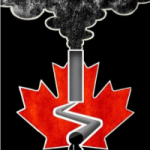
Canada's poverty rates have skyrocketed in step with the growth of the energy sector.
by Stephen Leahy
Few are aware Canada's GDP shot up from an average of $600 billion per year in the 1990s to more than $1.7 trillion in 2012. This near tripling of the GDP is largely due to fossil fuel investments and exports. However not many Canadians are three times wealthier. For one thing GDP is only a measure of economic activity. The other reason is that little of this new wealth stayed in Canada. And what did stay went to a small percentage of the population, worsening the gap between rich and poor.
One of the hallmarks of a “petro-state” is that while a country's energy industry generates fantastic amounts of money, the bulk of its citizens remain poor. Nigeria is a good example. Canada's poverty rates have skyrocketed in step with the growth of the energy sector. One Canadian child in seven now lives in poverty, according to the Conference Board of Canada, the country's foremost independent research organization.
The extraordinary wealth in one sector has been a disaster for the overall Canadian economy, according to another recent study. Up to 45 percent of job losses in Canada’s manufacturing sector can be attributed to what economists call “Dutch Disease.”
"Most of Canada's increase in wealth went to the big shareholders in the resource industries,” says Daniel Drache, a political scientist at Toronto's York University. “It mainly went to the elites."
Drache argues that Canada has moved into a type of “reckless resource capitalism,” sacrificing innovation and creativity. Resource extraction industries like logging, mining or fossil fuel production create relatively few jobs, and most of them are short-term positions. Almost all of the equipment used in Canada for resource extraction is made by other countries.
Drache says Canada's economy has completely reversed from its high-tech days of the 1980s and 1990s and has returned to its colonial roots as a "resource-based economy selling rocks [minerals] and logs" — and now oil and gas.
The extraordinary wealth in one sector has been a disaster for the overall Canadian economy, according to another recent study. Up to 45 percent of job losses in Canada's manufacturing sector can be attributed to what economists call "Dutch Disease," wrote authors from Canada and Europe in a peer-reviewed paper published November 2012 in the journal Resource and Energy Economics.
Dutch Disease refers to the many examples where an increase in exploitation of natural resources coincides with a decline in the manufacturing sector. It was first documented in the Netherlands during its North Sea oil boom in the 1960s.
Canada’s energy wealth has also exacerbated income inequality by spurring the cost of goods and services and making Canadian exports more expensive.
The study in Resource and Energy Economics found that the "Canadian currency has been driven up by the prices of commodities." As the Canadian currency gained strength, more than a half-million manufacturing jobs have been lost since 2000. In 2011 Canada lost industrial plants at twice the pace of the United States.
"This illustrates a negative side-effect of the oil-resource richness in Alberta," the study’s authors concluded.
That is a conclusion the Harper government does not want to hear, even though the study was commissioned in 2008 by a government department. Harper officials respond to concerns about "Dutch Disease", by saying the term is an insult to the hard-working employees in the resources sector.
There are not many to insult. Relatively few Canadians work in the resources sector, which is all about big machines and big money. The Alberta tar sands are the world's largest industrial project — with investments in the hundreds of billions of dollars — and only 20,000 people worked there in 2011. For all its rapid growth, Canada's oil and gas sector created only about 16,500 new jobs between 2000 to 2011, the same period in which 520,000 manufacturing jobs were lost.
For all its rapid growth, Canada’s oil and gas sector created only about 16,500 new jobs between 2000 to 2011, the same period in which 520,000 manufacturing jobs were lost.
One Response to “Canada becoming a petro-state”
Sorry, the comment form is closed at this time.

 Stephen Leahy is an environmental journalist based in Uxbridge, Ontario.
Stephen Leahy is an environmental journalist based in Uxbridge, Ontario.
[…] verdict should not be surprising. As documented in Canada becomes a petrostate, the world's new energy superpower is betting its future on profiting from dumping two billion […]